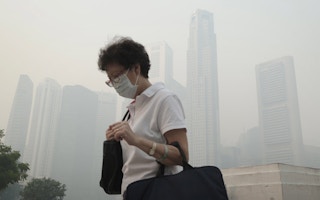The haze that recently engulfed Singapore has the potential to impact businesses beyond the obvious economic implications of a week’s worth of hazardous air.
Environmental awareness is at an all time high. Whilst many people are blaming Indonesia, the Singapore government is making it clear that businesses should be accountable for their environmental impact. When put together, increased awareness and government pressure mean that companies in Singapore may soon find themselves under the spotlight for their business operations.
The Pollutant Standards Index, or PSI, has become the new buzzword in Singapore. PSI is measured by the amount of concentration of five key air pollutants: sulphur dioxide, oxides of nitrogen, carbon monoxide, ozone and particulate matter. The respective reading of these amounts are then put into a formula developed by the United States’ Environmental Protection Agency (EPA), which produces the PSI number made available to the public through the National Environment Agency (NEA) website.
While many criticise the formula used by the NEA, PSI is still the number everyone watches out for, as it was reported every hour in Singapore during the height of the haze situation.
To put this into context, the NEA website experienced a 610 per cent increase in the number of page views in the past seven days. The graph below shows how interest spiked on the day the haze started to become harmful to people’s health.
Facebook pages, petitions, local and international media all generated a high level of awareness, which inevitably subsided when the sky turned blue again. But, and this is the important but, there is and will be a higher level of environmental awareness than ever before.
This environmental disaster was the immediate consequence of an action taken – burning. You could smell, taste and feel it. Singaporeans will not forget the fear caused by the actions of companies who have affeacted their health and economy. For many with a PSI app on their phone, a PSI reading is now only a thumb scroll away.
Currently, media reports state that the Singapore government is under pressure. The melting pot nation, now reaching maturity with a high level of foreign workers, is creating new issues. The government is directing citizens’ anger about the filthy air at those responsible for the pollution – companies. At the same time, the government is also implicitly telling citizens to take action against those companies.
The Prime Minister and the Foreign Minister both made statements that Singapore companies will face legal action if found to be involved in the burning.
Minister for Environment and Water Resources Vivian Balakrishnan posted on his Facebook page last week:
“We need to exert commercial pressure against companies causing the haze. I just spoke to Indonesian Minister Balthasar Kambuaya. Expressed our deep distress with the situation. This is the worst in 7 years - and has practically become a permanent fixture every year.
I suggested Minister Kambuaya name the companies responsible for the fires - (as I am sure consumers will know what to do).”
The Consumers Association of Singapore (CASE) also criticised the companies responsible for illegal land clearing activities in Indonesia. CASE president Lim Biow Chuan even supported the announcement made by the Singapore Manufacturing Federation calling for decisive actions to be taken against these companies.
The narrative from the government is clear: public anger should focus on companies and their activities.
So what happens when the haze clears? According to the Prime Minister, that could take months, in which case the longer the air is brown and our eyes are red, the longer our children are kept inside and our elderly become unwell, then the greater the backlash against polluters will become. But aside from these specific polluters and the potential actions to be taken against individual firms, there are broader implications for businesses.
Gaze through the haze and you can see a nation ready to ask businesses questions they haven’t been asked before. You can hear a narrative from government which clearly looks to those financing unsustainable business practices and regulating their activities and to consumers themselves, and tells them to hold businesses accountable for their environmental impact. The message is clear: it’s time to ‘go beyond superficial CSR initiatives’.
Erin Lyon is the executive director of CSR Asia, and formerly worked with Freshfields Bruckhaus Deringer both in Europe and Asia.








